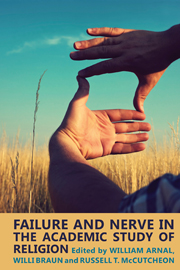Book contents
- Frontmatter
- Content
- Preface
- Acknowledgments
- Contributors
- Epigraph
- The Nerve of Donald Wiebe
- The Failure of Nerve in the Academic Study of Religion
- General Failures
- Special Failures
- Failures (of Nerve?) in the Study of Islamic Origins
- The Failure of Islamic Studies Post-9/11: A Contextualization and Analysis
- Religious Studies that Really Schmecks: Introducing Food to the Academic Study of Religion
- Cultural Anthropology and Corinthian Food Fights: Structure and History in the Lord's Dinner
- The Identity of Q in the First Century: Reproducing a Theological Narrative
- The Failure of Nerve to Recognize Violence in Early Christianity: The Case of the Parable of the Assassin
- Redescribing Iconoclasm: Holey Frescoes and Identity Formation
- In Lieu of Conclusion
- Index of Authors
The Failure of Islamic Studies Post-9/11: A Contextualization and Analysis
from Special Failures
- Frontmatter
- Content
- Preface
- Acknowledgments
- Contributors
- Epigraph
- The Nerve of Donald Wiebe
- The Failure of Nerve in the Academic Study of Religion
- General Failures
- Special Failures
- Failures (of Nerve?) in the Study of Islamic Origins
- The Failure of Islamic Studies Post-9/11: A Contextualization and Analysis
- Religious Studies that Really Schmecks: Introducing Food to the Academic Study of Religion
- Cultural Anthropology and Corinthian Food Fights: Structure and History in the Lord's Dinner
- The Identity of Q in the First Century: Reproducing a Theological Narrative
- The Failure of Nerve to Recognize Violence in Early Christianity: The Case of the Parable of the Assassin
- Redescribing Iconoclasm: Holey Frescoes and Identity Formation
- In Lieu of Conclusion
- Index of Authors
Summary
In his “The Failure of Nerve in the Academic Study of Religion” (1984; republished 1999), Donald Wiebe correctly pointed to the categorical mistakes and conceptual failures that have plagued the academic study of religion. Whether in the grand comparative studies of yesteryear or increasingly in more focused sub-disciplinary treatments, the tendency is to privilege understanding and description at the expense of explanation and analysis. Although certainly Religious Studies, speaking generally, has yet to take Wiebe's assessment seriously, I focus here on what is, perhaps, the weakest and most apologetical link in its disciplinary chain: the academic study of Islam. This sub-discipline, especially in the years post–9/11, has gained considerable capital and the interest that goes along with it.
For Wiebe, Religious Studies—and, by extension, Islamic Studies—has given up any claims to scientific disciplinarity owing to its wholesale rejection of objectivity, disinterestedness, and reductionism. What we have, instead, is nothing short of confessionalism: an academic discipline that endorses and indeed even apologizes for the religious beliefs and practices of others. Although I disagree with Wiebe's dismissal of humanistic or, what he calls, “postmodern” theorizing of religion and his desire to replace such theorizing, especially in recent years, with a more cognitive “turn,” I find myself indebted to Wiebe for his refusal to accept the status quo, his unwillingness to make the academic study of religion into a smorgasbord of world spirituality, and his fight for academic respectability.
- Type
- Chapter
- Information
- Failure and Nerve in the Academic Study of Religion , pp. 129 - 146Publisher: Acumen PublishingPrint publication year: 2012

